In ancient India, wells full of Desi Cow Ghee were especially for those who suffered wounds. When a surgeon cuts open a body, he only does so knowing that the body will be able to heal itself. The surgeon cannot do this. Desi cow ghee is known for the quality of Ropana- healing, and its effectiveness in facilitating recovery from wounds. In Ayurveda, when a person has a chronic peptic ulcer or gastritis, desi cow ghee is used to heal that ulcer inside the intestinal tract. Desi ghee works wondrously on bedsores for the elderly or debilitated. It can be applied for broken bones and injuries. It is highly effective for all types of skin rashes. Desi ghee is also used on burns of both fire and chemicals.
Desi cow ghee has been shown to be effective at repairing and restoring the skin. It is also antiviral which means it’s perfect for sterilizing cuts, scrapes and burns.
Desi cow ghee and honey has been advocated and used as dressing for infected wounds by Sushruta (600BC). Ayurvedic literature has been , over the centuries, the healing properties of ghee both systemic and topical. Sushruta in his surgical treatise Sushruta Samhita postulated that the combination of desi ghee (ghrita) and honey (madhu) for wound healing would have the synergistic healing effect of each one.
Ghee is essentially butter that has been strained to have all the milk solids and water removed, leaving just the protein and fat. Desi cow ghee is actually full of beneficial nutrients and contains a balance of short, medium and long chain fatty acids that help to enhance the absorption of nutrients and alkalize the blood.
Ghee has long been used in Indian cooking and is used in many Ayurvedic remedies due to its potency and therapeutic benefits which include:
The Healing Properties of Ghee
- Wound Healing: Desi ghee has been shown to be effective at repairing and restoring the skin. It is also antiviral which means its perfect for sterilizing cuts, scrapes and burns.
- Burn injuries: Desi cow ghee is commonly used in India for the treatment of burns and wounds. Ghee based formulation were useful for wounds, painful ulcers, leprosy, insect bite wounds, herpes, wounds caused by heat or fire and deep wounds by external application as per the classical texts of Ayurveda.
- Fighting Inflammation: Ghee reduce the secretions of leukotrienes and prostaglandins, which both contribute to the formation of pain and swelling, due to the presence of omega-3 and omega-9 fatty acids.
- Reducing Cholesterol: Ghee has been found to reduce cholesterol due to the naturally occurring levels of conjugated linoleic acid (CLA). CLA has been shown to help boost the metabolism, increase muscle strength and endurance and decrease body fat.
- Relaxes the Doshas : Apart from improving memory, the traditional form of ghee renowned as panchatikta ghrita is produced from five herbs that are mixed all together with ghee to fight against illness, stabilize Vata, Pitta, and Kapha, and also helps in purifying the blood. Desi ghee’s mystifying components have extensive tissue-penetrating, anti-inflammatory, antitoxin, and antipruritic effects. Such fragrant, therapeutic, and beneficial herbs, such as Nimba Twaka, Patola Lata, Kantakari, Guduchi, and Vasa, are all that can be included in this medicated ghee to cure ailments.
- Improves Respiration : Ghee works wonders as one of the most important herbs used in Ayurvedic recipes is vasa. The properties of ghee helps in decreasing the symptoms of ailments related to bronchitis, asthma, and excessive mucus condition in the body. Also, renowned as a natural expectorant, possessing multiple healing properties, and is the optimum treatment for bleeding disorders, sore throats issues, coughs, colds, and other breathing related issues. Such nutrients are effortless to absorb when blended with Desi ghee. A fine quantity of this particular medicated ghee benefits in respiratory health and supports in the treatment of a cold, cough and flu.
- Reduction in Stress and Anxiety : For all natural remedies, ashwagandha has long been renowned as the prompt among all indigenous Indian herbs. The properties of ashwagandha supports in calming the nervous system and decreases stress and anxiety. The combination of ashwagandha and ghee are powerful superfoods which holds-up healthy, beautiful skin and hair. Also, widely regarded as a Rasayana and a rejuvenator in Ayurveda. It possesses anti-arthritic, neurological, and anti-tumor effects.

- Helping digestion: Ghee is most commonly used in Ayurvedic remedies to strengthen and help digestive health. In studies, ghee was found to increase the secretion of stomach acids which aid to digest and absorb food.
A traditional Ayurvedic remedy for constipation and to remove toxins includes ingesting a teaspoon of desi ghee in hot water at the start of each day to help flush out the digestive system. - Boosting Memory: One of the most common Ayurvedic treatment for boosting your memory and helping with cognitive decline is eating ghee. It is said that desi ghee can enhance longevity and slow the ageing process.
- Strengthening Immunity: The high concentration of butyric acid found naturally in ghee has been shown to boost the immune system and is also believed to help fight off cancer cells. Ghee is also rich in antioxidants, Vitamins A, D, E and K.
- Enhancing absorption: In Ayurvedic medicine, desi cow ghee has been said to help transport the medicinal properties of herbs, spices and nutrients to organs and cells for better absorption. Ghee is also said to enhance the taste of spices used in Indian cuisine.
- Strengthening the Aura: In Ayurvedic medicine it is believed that desi ghee has the ability to strengthen the aura and bring increased energy, libido and vitality to the body.
Ghee is also a perfect cooking medium as it can withstand temperatures of up to 250 °C (482 °F) which means that unlike vegetable oils it will not turn rancid when heated. It also gives foods a mild, nutty flavor that compliments spices and savory seasonings.
Read our blog – Why The Pure Desi Cow Milk Ghee Is Costlier Than Normal Ghee?
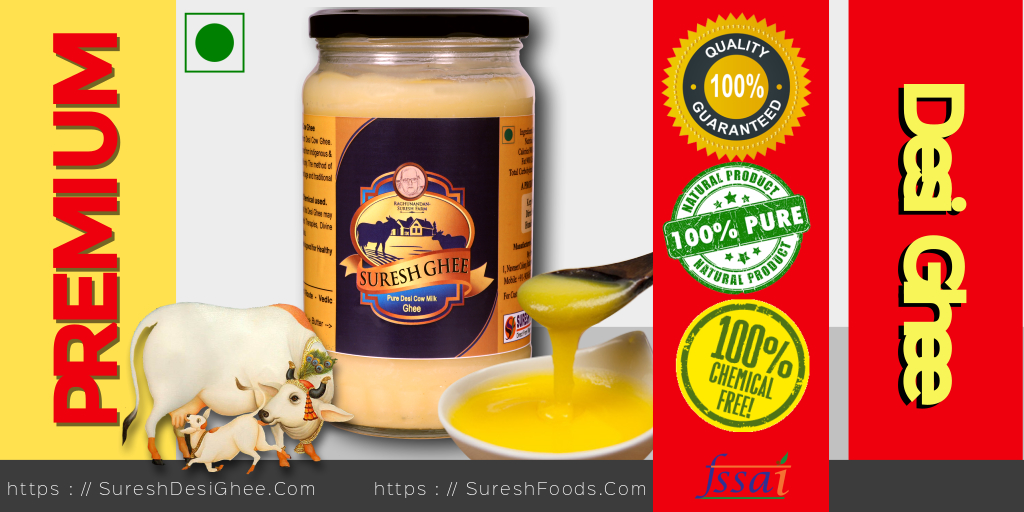

Medicinal use of cow ghee
Cow Ghee utilized in Ayurveda, used for numerous medical applications, including the treatment of allergy, wounds, skin and respiratory diseases. It is also known to retard the undesirable effects of drugs besides cancelling the effect of toxins in the body. However, Cow ghee has to be used in its optimum quantity and form in order to increase the efficacy of the Ayurvedic preparations. Desi cow ghee based formulations in Ayurveda are aimed at treating ailments related to the nervous system, digestive system and for psychological ailments too.
Many Uses of Desi Cow Ghee
- In India it is said that if a few drops of desi ghee are placed in the nostrils then nosebleed can be checked. If this is done twice in a day, then headache can be get relief.
- Desi ghee is excellent for cooking and sautéing or stir-frying. Ghee has one of the highest flash points of all oils and it is very difficult to burn. In India, it is said that food is incomplete without the use of desi ghee.
- Desi ghee can be used as a bath oil. Take two tablespoons of desi ghee and mix with several drops of an essential oil of your choice.
- Desi Cow ghee is excellent for a gargle-gandush, to improve the health of the teeth and gums.
- Desi ghee is excellent for scrapes and both chemical and heat or fire burns. It can be used in the eyes for tiredness.
- Ghee is a great facial moisturizer.
- Desi ghee is used in Purvakarma, (early Panchakarma) where a small amount of desi ghee is taken first thing in the morning by the practitioner to oleate the internal organs and dissolve the toxic wastes in the tissues, allowing them to be carried to the digestive tract for elimination.
- It is used as a carrier or “yogavahi” for herbs and bhasmas because of its supreme penetrating qualities and thus ability to carry these substances deep into the dhatus or tissues.
Desi ghee has been shown to be effective at repairing and restoring the skin. It is also anti-viral which means its perfect for sterilizing cuts, scrapes and burns.
Cow’s ghee has been reported to exert significant wound healing activity. Its antifungal activity has also been shown to be independent of any antibiotic or antifungal agent, which may be included into the formulation. In the present case all antibiotics were discontinued and the formulation contained only cow’s ghee as an active component.
Cow’s ghee has been reported to exhibit antiulcer activity and also effective against infection in the eyes. Ghee contains several saturated and unsaturated fatty acids which are capable of taking part in metabolic processes involved in healing of any wound. It seems therefore worthwhile that the cow’s ghee is explored further as an effective clinical agent. Refer

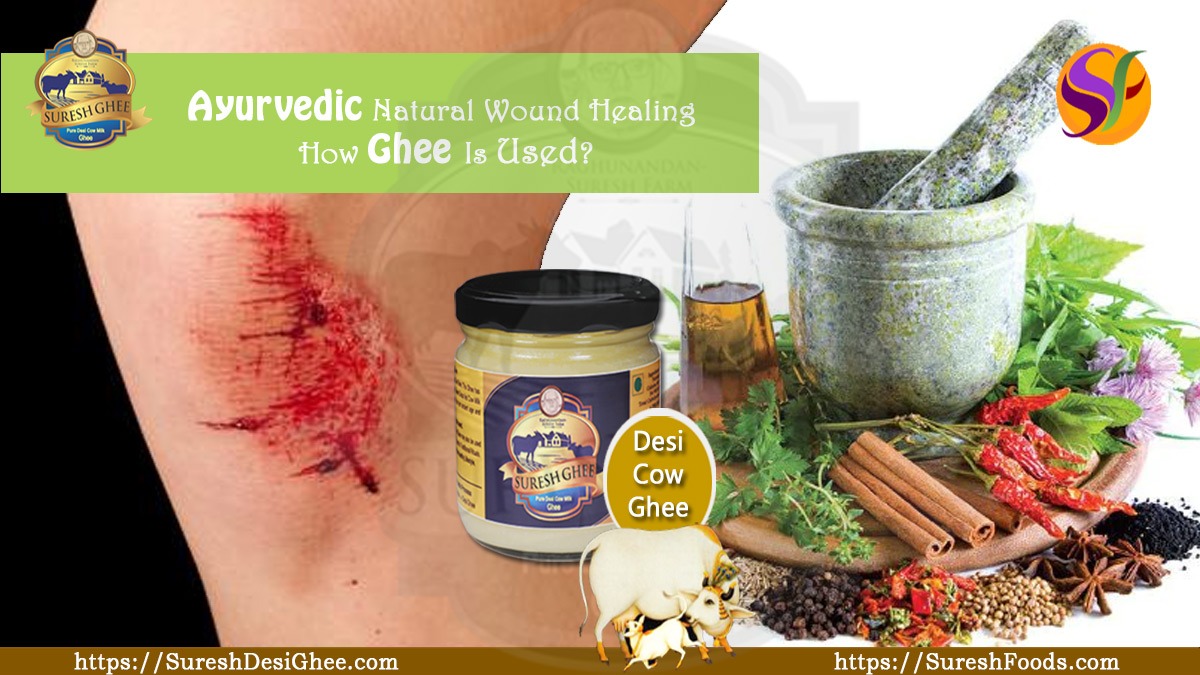
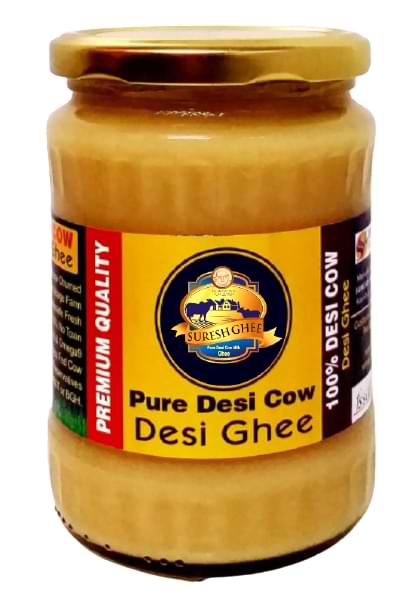
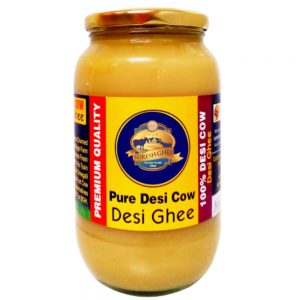
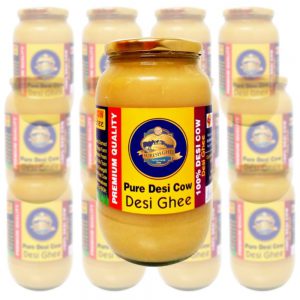
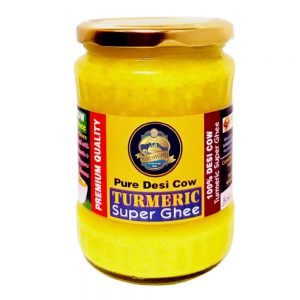
 WhatsApp us
WhatsApp us 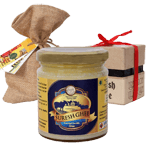
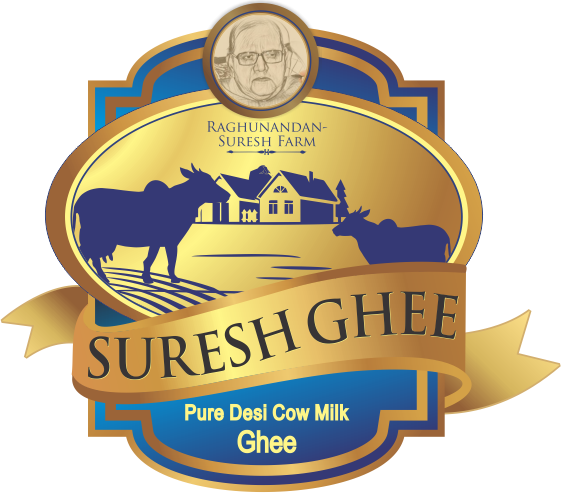
Naveen m...